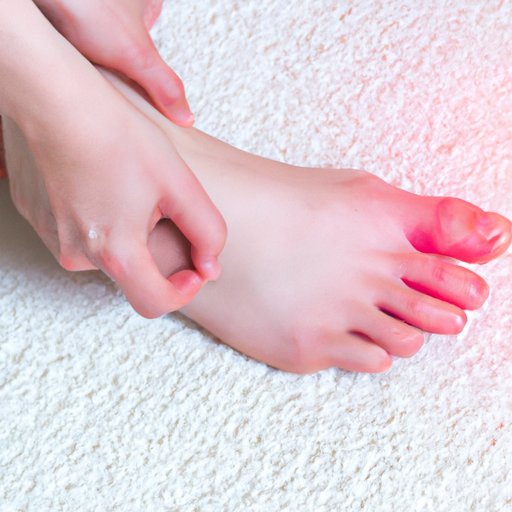Why Does My Foot Fall Asleep: Exploring the Science Behind Foot Numbness
Have you ever experienced the uncomfortable sensation of your foot falling asleep? It’s a common problem that most of us have experienced at least once in our lives. Foot numbness can be caused by a variety of factors, some of which are easy to remedy and others that may require medical attention. Understanding why your foot falls asleep is important for managing the discomfort and preventing it from happening in the future.
Exploring the Science Behind Why Our Feet Fall Asleep
The sensation of foot numbness is caused by nerve signals being interrupted. When we sit or stand in the same position for too long, the weight of our bodies can compress the nerves in our feet, which can cause a temporary loss of sensation. This happens because the blood supply to the nerves is temporarily disrupted. Once the pressure is relieved, the blood flow returns to normal, and the sensation returns to the foot.
The foot is a complex structure made up of nerves, blood vessels, muscles, and bones. The nerves in our feet play a critical role in both feeling and movement. They send signals to our brain, informing us about sensations such as pain, temperature, and pressure. They also control the movement of our feet and toes.
If these signals are interrupted, our feet may fall asleep. This can happen for a variety of reasons, including nerve compression, poor circulation, or medical conditions that affect nerve function.
5 Surprising Reasons Your Foot Might Be Falling Asleep
Sitting or standing in the same position for too long is the most common reason for foot numbness. However, there are other surprising reasons that you may not be aware of:
1. Wearing shoes that are too tight or high heels
Uncomfortable shoes can put pressure on your feet, restricting blood flow and compressing nerves, leading to foot numbness.
2. Crossing legs
Sitting with crossed legs can put pressure on the nerves in the legs, leading to foot numbness.
3. Medical conditions such as diabetes or multiple sclerosis
Medical conditions that affect nerve function can lead to foot numbness.
4. Certain medications that affect nerve function
Some medications can affect nerve function and cause foot numbness.
5. Nutritional deficiencies
Malnutrition, particularly a vitamin B12 deficiency, can cause nerve damage that can lead to foot numbness.
Is Your Foot Falling Asleep Because of Poor Circulation? Here’s What You Need to Know
Poor circulation can also lead to foot numbness. When blood flow to the feet is restricted, the nerves in the feet may not receive enough oxygen and nutrients, leading to numbness. Poor circulation can be caused by a variety of factors, including:
1. Smoking
Smoking restricts blood flow, which can lead to poor circulation in the feet.
2. High blood pressure
High blood pressure can cause the vessels in the feet to narrow, restricting blood flow.
3. High cholesterol
High levels of cholesterol can cause plaque buildup in the arteries, restricting blood flow to the feet.
4. Diabetes
Diabetes can damage the blood vessels and nerves in the feet, leading to poor circulation.
If you suspect that poor circulation is the cause of your foot numbness, it’s important to address the underlying causes of poor circulation.
The Effects of Nerve Compression on Foot Numbness: Understanding Why Your Foot Falls Asleep
Nerve compression occurs when there is pressure on the nerves in the feet. This pressure can be caused by a variety of factors, including:
1. Repetitive motion
Repetitive motion, such as running, can put pressure on the nerves in the feet over time.
2. Trauma
Injuries to the feet, such as sprains or fractures, can cause nerve compression.
3. Tumors or cysts
Tumors or cysts that grow near the nerves in the feet can put pressure on the nerves, leading to numbness.
Diagnosis and treatment of nerve compression will depend on the underlying cause of the nerve compression.
How to Prevent Foot Numbness: Tips and Tricks to Keep Your Feet Awake and Pain-Free
To prevent foot numbness, it’s important to take steps to improve blood flow to the feet and prevent nerve compression. Here are some tips to keep your feet awake and pain-free:
1. Changing positions regularly
Avoid sitting or standing in the same position for too long. Take breaks and move around regularly.
2. Exercising regularly
Regular exercise can improve circulation and prevent nerve compression in the feet.
3. Wearing properly fitting shoes
Wear comfortable shoes that fit properly. Avoid high heels and shoes that are too tight.
4. Stretching and massage techniques
Stretching and massage can help improve blood flow to the feet and prevent nerve compression.
5. Managing underlying medical conditions
Take steps to manage medical conditions that can cause foot numbness, such as diabetes or high blood pressure.
Conclusion
Foot numbness can be an uncomfortable and inconvenient problem, but it’s usually not a cause for concern. By understanding the causes of foot numbness and taking steps to prevent it, you can keep your feet awake and pain-free. If foot numbness persists or is accompanied by other symptoms, it’s important to seek medical attention.
